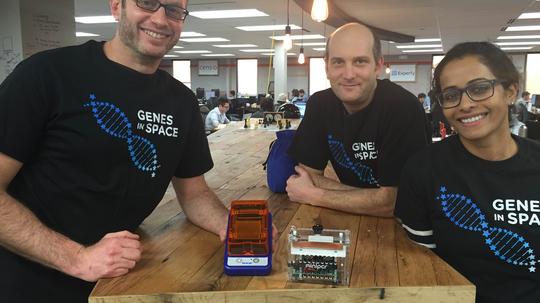
MiniPCR - the startup that’s bringing DNA technology to the masses - has started to grow so much that it’s out of this world. Literally. The company will be sending one of its machines up to space this spring as the result of an annual contest it’s started.
It doesn’t stop there. According to the founders, Ezequiel (“Zeke”) Alvarez-Saavedra and Sebastian Kraves, NASA intends to take their machines to the space station to do its own experimentation.
To keep it high-level, a PCR machine allows people to conduct DNA analysis for a multitude of purposes, including forensics, pharmaceuticals and even agriculture. Although PCR technology isn’t new, the machines are normally big and bulky, expensive and require a great deal of power to work. MiniPCR is a PCR machine that is just as effective, but, as the name implies, is far more compact, battery-operated and inexpensive.
Alvarez-Saavedra and Kraves, who both hold PhDs in the sciences, explained that their own education pushed them to invent an improved PCR machine. Beginning in middle school, they noticed their abilities to learn was limited because the equipment needed to explore modern, more advanced scientific concepts was so expensive.
“There was essentially nothing to do biology with...We’re trying to change what we had found growing up - a lack of access to the necessary tools,” said Alvarez-Saavedra. “There are a bunch of reasons for that: Mainly, these tools have been expensive so it’s been hard to afford them."
Kraves added,“The idea in our head is that we could help teachers teach biology in the 21st century.”
Two and a half years ago, they began their startup journey, developing their machine. They started off making the equipment in their basements on weekends and nights. Eventually, they were able to launch a Kickstarter campaign, moving on to participate in MassChallenge.
It was at MassChallenge that Boeing discovered the the miniPCR team. The organization was excited to see what they were doing and immediately voiced an interest in getting their machines.
Alvarez-Saavedra explained what went down:
One of the things we quickly found is that there is not only interest from teachers and educators, but from so many more types of people. NASA is constantly updating the national laboratory at the space station and constantly equipping it with new technologies. At MassChallenge, Boeing saw our PCR machine and got so excited. They wanted to do PCR at the station for some time, and our machine had all requirements they were looking for: It’s small and uses a low amount of power. They didn’t ask for any modifications for them to be able to fly it up.
From there, miniPCR and Boeing were inspired to form its Genes in Space Competition, which asks students to design an experiment to be done in space. The winning student will actually have his or her experiment flown up to the space station to be carried out. This is the second year that the startup is holding this contest as a means to increase STEM awareness in schools. Last year’s winner is having her experiment rocketed up to space in May.
Why would NASA possibly need a PCR machine? Alvarez-Saavedra and Kraves aren’t quite sure yet, but they said there are numerous applications for DNA analysis that would be in the organization’s scope for experimentation.
Alvarez-Saavedra said:
We don’t know what NASA is looking to do with it. It depends on each researcher. We’ve heard from a few different ones, but we haven’t gotten to point of understanding what they need. The experiments could be anything that involves DNA - from studying things that go from Earth to the space station and how they change to how things like bacteria change at the space station change while they’re there all the way to looking for extraterrestrial life. It’s wide-ranging so we just don’t know yet.
Now that the startup is spreading its product’s reach to space, what’s on tap next? The founders shared that they’re about to launch a new piece of equipment that should make a major impact in the realm of scientific research and prompt the company to grow.
“We’re launching our DNA discovery system, which is essentially a biotech lab for under $1,000,” according to Alvarez-Saavedra. “We already have pre-orders for almost 200 of these systems. We think it’s going to be a big year for us.”
“We’re self-sustaining and growing. We’re committed to mission and trying to keep it going through own operations rather than taking investments,” Kraves said. “Our main goal is to enable biology...The ultimate milestone is to guarantee that every person gets their hands on DNA technology, but that’s very ambitious for this year.”








